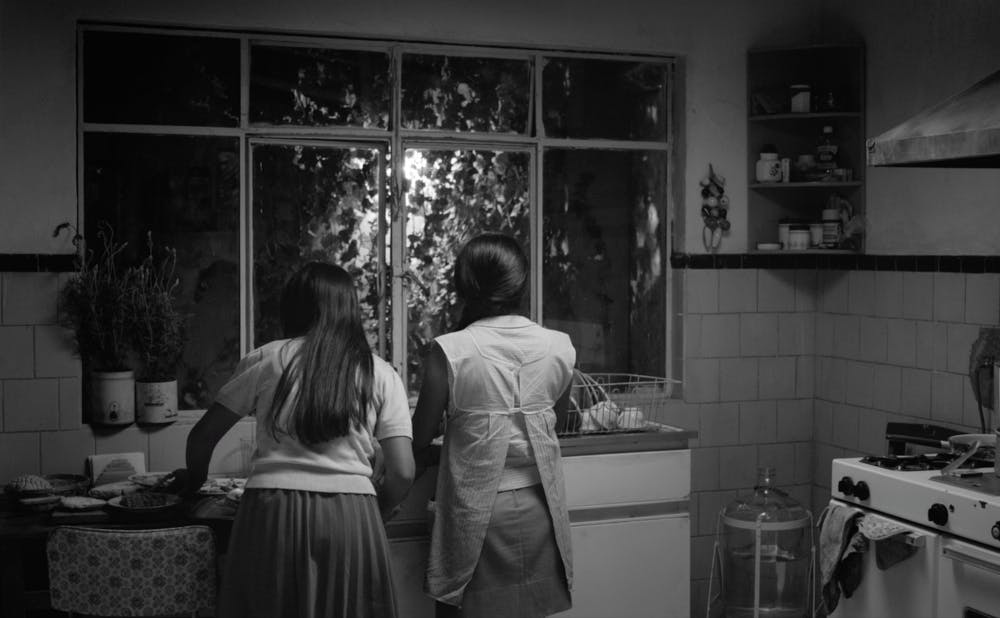A marble floor comes into focus as the opening credits begin to play. No music, no conversation, just the simple sound of the water swishing across the pavement and a plane's engine booming overhead. It is only clear when the credits finish that the scene is not of a school or a hospital, but someone’s home, and that the person washing the floor does not live there, but works as a housekeeper. This film is her story: as a housekeeper, as a woman and as someone who is truly alone in this world. Her story is one of love, compassion, loyalty, heartbreak and loss, and it drives what can only be called one of the year’s best films.
“ROMA” is a wonderful take on the human condition. Director Alfonso Cuarón crafts a story that blends Mexican culture and the universally shared feeling of loneliness to create a unique narrative that reminds the viewer that, while being alone can be hard, comfort and comradery can be found among others with similar experiences. As a result, the film explores the bond that can form from being alone together.
What truly makes “ROMA” great is its storytelling method. The best way to watch this movie is in a dark space with the volume maxed out. As much as “Dunkirk” and “First Man,” “ROMA” is an experiential film. However, it is in a different vein than the other two. They explore the rather harsh and extreme conditions of war and space travel, respectively, but “ROMA” tackles everyday life in Mexico City. As a result, the dominant sounds are not of gunshots and explosions, but of street chatter, dogs barking, planes flying overhead and mariachi music.
The goal is to make the viewer feel like they have just spent two hours in Latin America, all without a score. Every scene maintains the background noise captured while filming: the shouting of people from the streets, the birds chirping in their cage, the cries and screams of people in the hospital and even the boom of plane jet engines flying overhead.
Cuarón complements the auditory experience with an even more unique visual experience. As each scene ends, the camera continues to film five to 10 more seconds. Although appearing to contribute nothing to the film, it adds an extra layer of beauty and a connection to reality. These still shots focus on mundane pieces of life like birds in a cage, cars driving on the street or even a woman washing the floor. Cuarón does all this to present an authentic, unedited version of life in Mexico City that will remind people who have visited the region of their fondest memories or transport those who have never been to a land of chaos and wonder.
To accompany the excellent filming techniques, “ROMA” explores the theme of loneliness, particularly as it applies to women. The main characters are present and future mothers who are largely abandoned by their significant others. The experience of the main character, Cleo, is the most jarring in this film. Cleo is a young woman who becomes pregnant after her first sexual experience. This realization initially causes worry, which scales up to true terror when she realizes that the man who got her pregnant will not help with the child. As the film progresses, we see Cleo become increasingly isolated as she withdraws from interactions with other children. Through Cleo, Cuarón presents a narrative of worry, fear, and ultimately loneliness. It is through this powerful narrative that the audience is exposed to the struggle of single parenthood.
The intense narrative that “ROMA” captures is truly mesmerizing insight into daily life. The details that Cuaron captures in his film immerse the viewer in the region and gives audiences a sense of the serenity and chaos of life in Mexico City. Its intense themes of motherhood and loneliness challenge American norms while offering experiences to which everyone can relate. The intricacies of the film demonstrate that “ROMA” was not built in a day.
Get The Chronicle straight to your inbox
Signup for our weekly newsletter. Cancel at any time.

